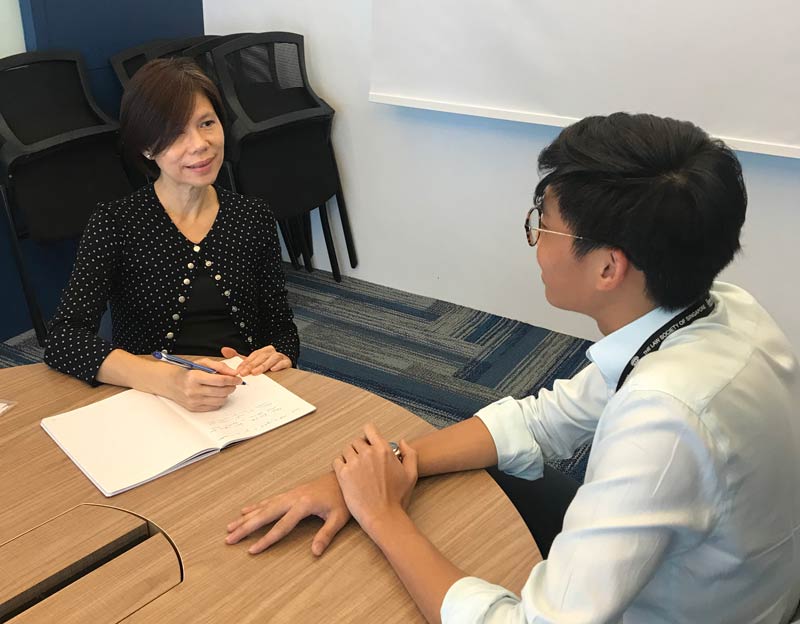
Career Counselling: Navigating Your Path in the Legal Profession
Law, as a profession, can be challenging, if not downright stressful – the job is demanding, the hours are long, and the clients may not be the easiest to deal with. During these trying times, you may look at others thriving in these exact conditions, and wonder if you are really cut out for this profession. Self-doubt will creep in. No one seems to understand the doubts that have been gnawing at you from the inside, maybe there isn’t anyone that you can really talk to about these issues that have been brewing, and you might even feel like you have lost all direction.
Career Path
Launched in May this year, the Law Society’s Career Path scheme provides an opportunity for young lawyers to consult with one of our three career guidance/counselling volunteers on career and work related issues. Ultimately, Career Path aims to help young lawyers understand themselves, their strengths and weaknesses, in order for them to chart their own career path, and to address work related issues.
We spoke to Sin Chei Liang and Faith Gan who are career counselling volunteers for the Career Path Scheme on their observations and experience with the career counselling sessions and their thoughts on where the legal profession is heading.
What led you to volunteer for the Career Path programme as counsellor?
Chei Liang: I was a corporate lawyer throughout my legal career, and during my practice I had come across a number of lawyers who encountered various work issues like overwork, low job satisfaction, unsatisfactory working environment, job-fit mismatch, coping difficulty, lack of meaning, career advancement uncertainty. This resulted in them experiencing extreme stress or burnout, some to the extent of suffering from anxiety or depression. If these issues are not addressed in the early stage, they can develop into major anxiety or depression disorders.
Since I am currently pursuing my Masters (advanced) in Counselling, I thought I would put my counselling skills to good use. I find immense meaning and fulfilment in helping our lawyers see the underlying issues and navigate their path.
Faith: One of my friends in legal practice drew the Career Path scheme to my attention and suggested that my experience could be helpful for this pro bono initiative as I regularly engage younger lawyers, especially in a career-related context.
As volunteers of this new initiative, what do you hope to achieve?
Chei Liang: I am hoping that through this scheme, our lawyers who might be encountering various issues in their practice will have an avenue to seek counselling or guidance from an objective third party and a trained counsellor. I strongly believe that these lawyers would benefit from being able to voice their concerns in a safe environment, with the objective of seeking counsel. There will be no concern about confidentiality, as we maintain strict confidence of our sessions with the lawyers, and no firm or organisation (including the Law Society) will have access to any information shared during the sessions.
Faith: I hope to provide a confidential forum to hear work-related concerns and frustrations and in so doing, work with those who attend to crystallize the issues at hand. If asked, I also provide insight on hiring practices in local and international law firms, from my own experience in recruitment in these firms; as well as provide encouragement and highlight the positive steps already taken.
From your experience, what are the common concerns that young lawyers face?
Chei Liang: Based on the counsellees whom I have seen so far, most of them have stress/burnout/self-doubt issues, while others have concerns over career path direction, job satisfaction and working environment.
In May this year, the World Health Organisation (WHO) started to recognise burnout as an occupational phenomenon, and include burnout in its International Classification of Disease, a global reference tool used to map health conditions. In view of the current stressful world that we live in, it would be helpful for employers and organisations to provide appropriate avenues of help to their employees. I think it is very kind and forward looking on the part of the Law Society to launch this initiative and provide this avenue to its members. I hope this initiative will continue as a long-term programme.
Faith: I have noticed a lack of work-life balance, and a lack of understanding/appreciation as to what is required in order to build a sustainable legal practice. I have also observed that there is uncertainty as to whether legal practice is the long-term goal.
We all face stress or self-doubt at work all the time; at what point should one seek help or counselling?
Chei Liang: I think if the stress gives rise to either emotional distress or anxiety symptoms or affects some aspect of our daily functioning (for example, an inability to sleep or eat well), it is definitely time to seek help or counselling.
Faith: Anytime you feel that you would like an independent third party’s views and are willing to hear from someone outside your immediate circle.
Is there any simple tool for one to do self-appraisal in order to determine if help is needed?
Chei Liang: There is no simple tool as such, and each individual is different. Some people may be more vulnerable than others due to their personality or upbringing. My advice is that if you feel that you are overwhelmed and find it difficult to cope, or are constantly worrying about your performance, or are feeling miserable about your work, or experience physiological symptoms (such as a fast heart-beat, rapid breathing, an inability to concentrate), or feel helpless, hopeless, worthless or meaningless, you should consider seeking help. Always listen to your body and your heart, they do not lie.
Faith: Please refer to my answer to question 4 above.
How do you think lawyers can benefit from this programme?
Chei Liang: This programme currently has three volunteers with different backgrounds, but all three have been working in the legal industry. I note that the Law Society is careful in getting the right people on board, and refer the cases to the suitable counsellors depending on the issues. Speaking for myself, many of my counsellees find that I have been helpful to them because I understand their situation and can relate to their issues without them having to explain at length to me, given that I was a practising lawyer with varied life experiences. With my ability to understand their concerns and identify their issues, I am able to help them become more self-aware of their real underlying issues, and this makes the sessions more efficient.
Faith: I wouldn’t say that career counselling in this context is “help” per se. I would categorize it as facilitation by someone with legal industry recruitment experience (preferably in the private practice context) hear you out as you process your thoughts.
What do you foresee the future of the legal profession to be like?
Chei Liang: If I were to hazard a guess, I believe lawyers increasingly will have to be more than just technically good at what they do. They will also need to have a lot of emotional resilience, good interpersonal skills and technology capabilities, in order to be able to stay in practice for the long haul. This is because legal practice will continue to become more challenging with the ever increasing competition and technology advancement. Competition drives down pricing, and demands higher efficiency in order to maintain the profits of law firms. This translates to longer working hours, juggling of multiple cases and lawyers having to do business development. On the technology front, lawyers who are doing work which could be replaced by artificial intelligence (AI) may be displaced to a certain extent and will have to up their game. There are many challenges ahead, and it is getting harder for lawyers to find balance in their lives, but it is not impossible, as it is a matter of finding the right fit for themselves, just like any other profession.
Faith: I foresee a more challenging business environment, which requires individuals to be flexible, creative and committed. At this moment, we are already seeing more integration with other professions and may see more business models emerge in the future.
*Answers have been edited for length and clarity.
Interested members can write to the Membership Department at [email protected]

Ms Sin Chei Liang at a mock counselling session






